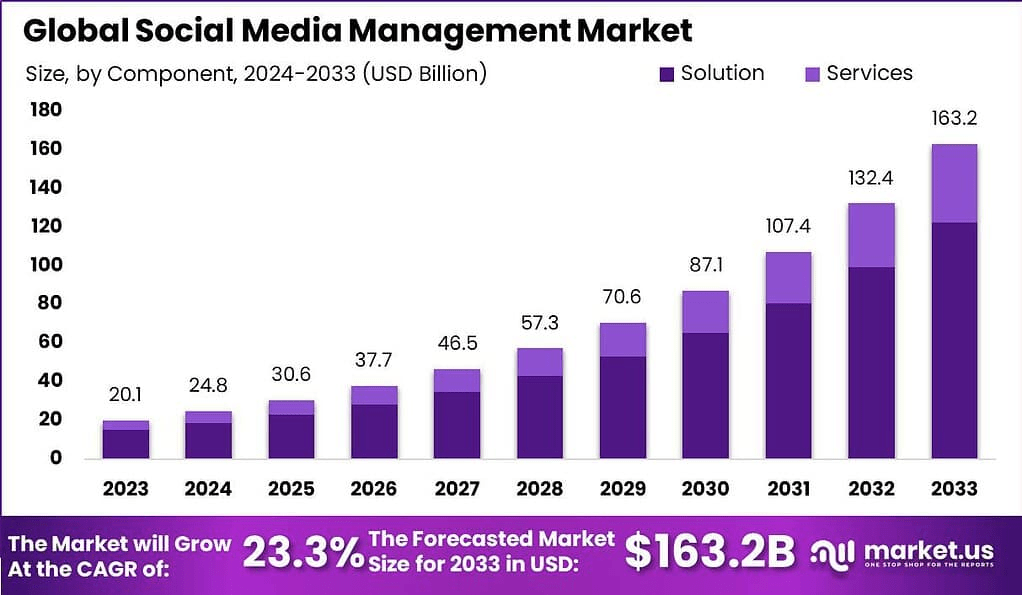
Introduction:
The Social Media Management Market is projected to surpass USD 28 billion by 2030, growing at a CAGR of 17.4% from 2024. As businesses prioritize digital presence and brand engagement, demand for centralized tools to manage content, campaigns, analytics, and customer interaction is surging. The increasing volume of social content, data privacy regulations, and the shift to omnichannel strategies are fueling adoption. SMEs and large enterprises alike are investing in platforms that offer real-time engagement, social listening, and ROI analytics. The market’s growth is being shaped by influencer marketing, e-commerce integration, and AI-powered automation capabilities.
Key Takeaways:
- Market projected to reach USD 28 billion by 2030
- CAGR of 17.4% driven by demand for real-time engagement
- Rising adoption among SMEs and large enterprises
- AI-powered automation enhances efficiency and analytics
- Influencer marketing boosts platform integrations
- Cross-platform publishing tools gain traction
- Social listening tools increasingly used for brand sentiment
- Integration with CRM and e-commerce platforms rising
- Data privacy compliance features becoming standard
- North America leads; APAC shows fastest growth
Emerging Trends:
AI and machine learning are transforming sentiment analysis, chatbots, and content optimization. Platforms are adding social commerce tools to enable direct product sales. Integration with customer data platforms (CDPs) allows deeper personalization. Video-first strategies and short-form content tools are increasingly prioritized. Tools are evolving to manage decentralized platforms like Threads and Mastodon. Conversational AI is automating customer interaction and lead generation. Real-time analytics and predictive engagement features are being rolled out. Platforms are integrating with virtual influencers and the metaverse. Growing focus on ethical AI in content moderation is shaping platform development. Enhanced mobile app functionality allows on-the-go campaign management.
Use Cases:
- Centralized scheduling and publishing across multiple social platforms
- Real-time customer engagement and complaint resolution
- Social listening for market insights and competitor analysis
- Influencer campaign management and ROI tracking
- AI-based sentiment analysis for brand reputation monitoring
- Lead generation through targeted social advertising
- Content calendar and approval workflow for marketing teams
- Integration with CRM to personalize social interactions
- Automated reporting for campaign performance tracking
- Social media governance and compliance monitoring in regulated sectors
Major Challenges:
Managing content across fragmented platforms increases complexity. Rapid algorithm changes hinder content visibility and strategy consistency. Data privacy regulations (e.g., GDPR, CCPA) complicate user tracking and analytics. ROI attribution remains a challenge for social campaigns. Handling misinformation and inappropriate content requires robust moderation. Resource constraints in SMEs limit comprehensive tool adoption. Disjointed tech stacks cause integration issues. Real-time engagement demands round-the-clock monitoring. Scaling personalization without violating privacy is difficult. Saturation of social content leads to declining organic reach, pressuring paid strategies.
Opportunities:
Growth in influencer and affiliate marketing drives demand for integrated tools. Social commerce and live selling open monetization avenues. Expansion in emerging markets fuels new user adoption. Integration with AI and predictive analytics enhances targeting. Vertical-specific solutions (e.g., healthcare, education) are gaining traction. SMB-focused freemium models broaden the customer base. Voice and visual search capabilities offer differentiation. ESG and corporate responsibility communication opens engagement opportunities. Platforms offering compliance automation appeal to regulated industries. Rise in micro-communities allows tools to focus on niche audience engagement.
Key Players Analysis:
The market consists of SaaS providers specializing in content scheduling, analytics, social listening, and engagement automation. Key players differentiate through scalability, integration with third-party CRMs and e-commerce platforms, and AI-driven insights. Competitive strategies include freemium models, targeted vertical solutions, and advanced workflow tools.
Firms are investing in mobile-first interfaces, influencer collaboration features, and multilingual support. Partnerships with ad platforms and customer service tools enhance ecosystem value. Players with strong API frameworks enable better customization. Continuous innovation in predictive analytics, cross-platform performance tracking, and brand safety tools defines market leadership. Security, usability, and user onboarding support remain major differentiators.
Conclusion:
The Social Media Management Market is rapidly evolving into a strategic function essential for brand visibility, customer engagement, and data-driven marketing. As digital touchpoints multiply, organizations need centralized, intelligent platforms to manage complexity and ensure consistent communication. Despite challenges around regulation, visibility, and ROI tracking, advancements in AI, automation, and e-commerce integration are expanding possibilities. The market is poised for strong, sustained growth, especially among SMEs, niche influencers, and enterprises seeking to unify digital strategies. In a landscape defined by speed and personalization, social media management is no longer optional—it’s a core driver of competitive advantage.
The macro analyst desk brings highly sought after financial news based on market analysis, insider news and company filings.
